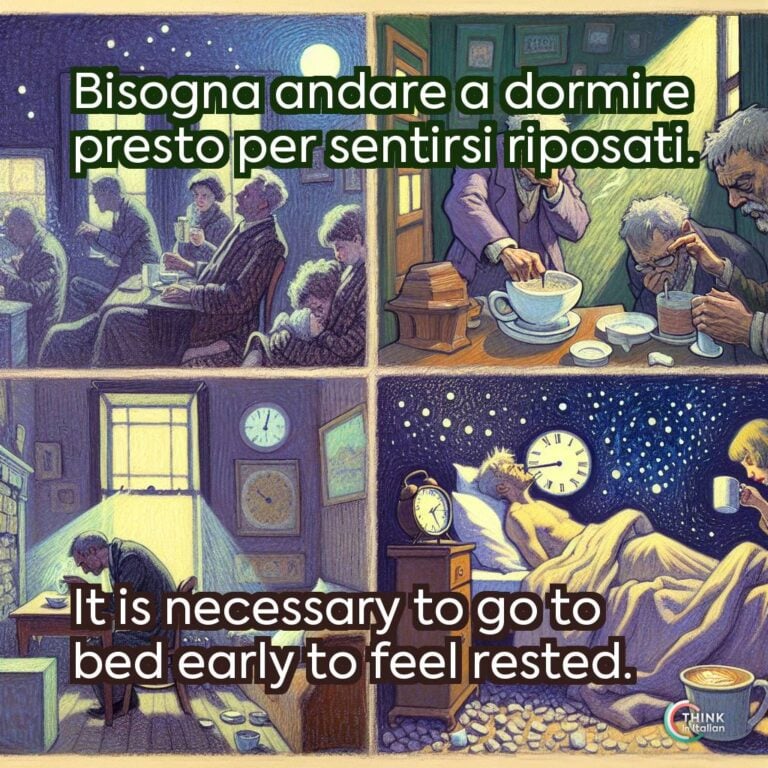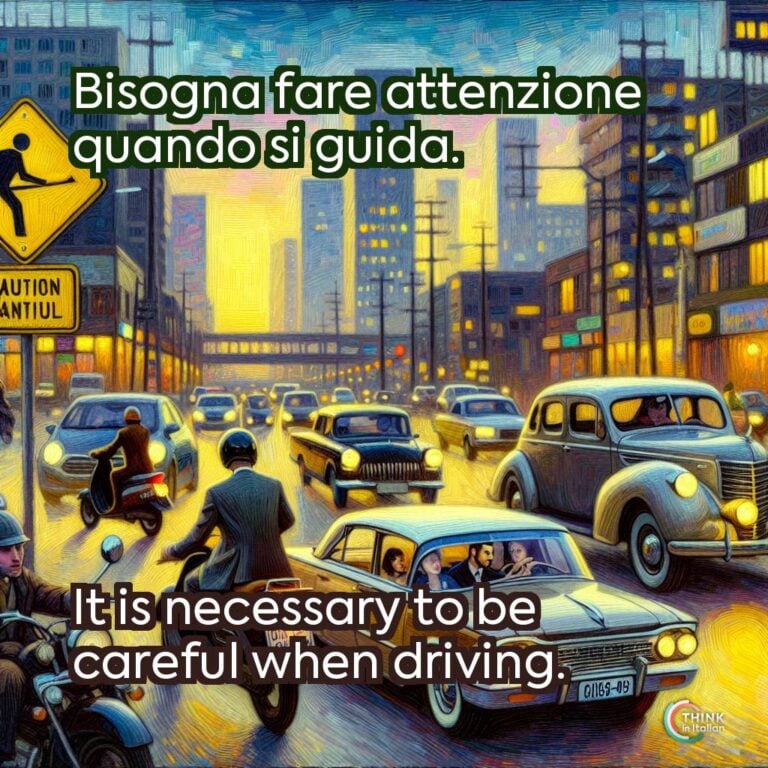“Bisogna” in Italian
Bisogna: Meaning
The most straightforward translation of the Italian word bisogna is “to need”. However, its translation cannot be literal, since in Italian is used with an impersonal nuance.
Let me show you an example:
Bisogna comprare il pane.
One needs to buy bread.
As you can see, the Italian expression is conjugated in the third person singular form, which is typical of Italian impersonal forms.
Bisogna: How to use
The verb bisogna can either be followed by an infinitive tense, or by che + subjunctive. However, I almost never use the latter one, and prefer the former.
Bisogna fare silenzio al cinema durante il film.
It is necessary to be quiet in the cinema during the movie.
Bisogna che gli studenti si impegnino di più.
It is necessary that the students work harder.
As I mentioned before, this verb is exclusively used in its impersonal form, meaning that it does not have a logical subject, but only a grammatical one which requires it to be conjugated in the third person singular.
If you want to understand better what I mean by logical subject vs grammatical subject, have a look at our article on the Italian impersonal “si”.
This verb can be conjugated in all verb tenses:
- Present (presente indicativo): bisogna
Bisogna studiare molto alla facoltà di ingegneria.
It is necessary to study a lot at the faculty of engineering.
- Simple future (futuro semplice): bisognerà
Questo parcheggio adesso è gratis, ma da giugno bisognerà pagare 1 euro all’ora.
This parking lot is free now but starting from June people will need to pay 1 euro per hour.
- Imperfect (imperfetto): bisognava
Prima della diffusione dei telefonini, bisognava ricordarsi molti numeri di telefono a memoria.
Before mobile phones became common, one needed to remember several phone numbers by heart.
- Present conditional (condizionale presente): bisognerebbe
Non sono sicuro. Bisognerebbe chiedere al manager.
I’m not sure. You would need to ask the manager.
Bisogna: When to use
Bisogna is used to express a general need or obligation. It refers to a general rule or something that applies to everyone.
Bisogna essere molto pazienti con i bambini.
You need to be patient when dealing with kids.
However, when followed by che + subjunctive, it can express a need or an obligation that a specific subject must perform.
Bisogna che tu te ne vada subito.
It is necessary that you leave immediately.
Other Expressions With “Bisogna”
In Italian, we have two other expressions that make use of the word bisogna to express necessity or need: avere bisogno di and c’è bisogno di. However, but they are used in slightly different contexts and constructions.
Avere bisogno di also translates to “to need” in English but it is used when you want to specify that someone or something needs something. It is a personal expression, meaning it is used with a subject.
The structure is the following: Subject + conjugated form of avere + bisogno di + noun/infinitive verb
For example:
Ho bisogno di aiuto.
I need help.
Avete bisogno di riposare.
You need to rest.
- C’è bisogno di:
C’è bisogno di translates to “there is a need for” or “it is necessary” in English and is used in a more general or impersonal sense, just like bisogno + infinitive.
The structure is the following: C’è bisogno di + noun/infinitive verb
For instance:
Examples:
C’è bisogno di un cambiamento.
There is a need for a change.
C’è bisogno di intervenire subito.
There is a need to intervene immediately.
Bisogna Studiare!
You need to study!
Practice the use of bisogna in Italian to convey necessity and obligation in various contexts and you’ll be able to express general needs in a easy and straightforward way. Italian impersonal constructions are very handy for this!
Remember, consistent practice and exposure to native Italian use will help you internalize these expressions. Keep practicing and engage in conversations to reinforce your learning.
If you do not know who to practice with, do it with our AI tutor!




